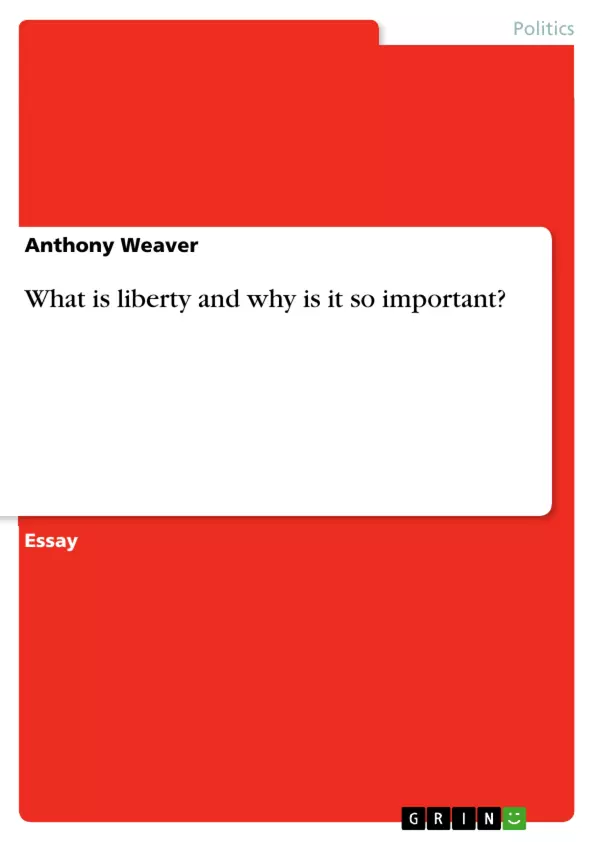The fundamental existential choice we have to make is between liberty, individual freedom, or slavery, which logically is the polar opposite. That is either we are allowed to make our owned decisions or they are made for us by others, namely the State. To be fully human, all of us must be free to exercise our choices and govern our lives, so long as we permit the same of others. Liberty follows from human nature: We are unique individuals, not an amorphous blob or an army of robots to be programmed by those with power. Liberty works.
Over and over again, it produces a degree of interpersonal cooperation, innovation, and wealth creation that allows human beings to flourish — nothing else even comes close. Liberty is the only social, political, or economic arrangement that requires that we live to high standards of conduct and character and rewards us when we do so. This is a crucial difference between liberty and the soul-crushing, paternalistic snares that are offered as alternatives. Life without liberty is unthinkable. Who wants to live at the end of another’s leash, fearing at every turn what those armed with force and power might do to us, even if they have good intentions?
Inhaltsverzeichnis (Table of Contents)
- Introduction
- What is Liberty
- Threats to Liberty
Zielsetzung und Themenschwerpunkte (Objectives and Key Themes)
This work aims to define liberty, explore its importance, and analyze contemporary threats to individual liberty, particularly focusing on leftist ideologies in the West.
- The definition and nature of liberty as a "negative" right.
- The indivisibility of life, liberty, and property.
- The dangers of leftist ideologies, specifically Critical Race Theory (CRT) and Diversity, Equity, and Inclusion (DEI).
- The contrast between objective justice and subjective "social justice."
- The incompatibility of socialism/communism with individual liberty.
Zusammenfassung der Kapitel (Chapter Summaries)
Introduction: This introduction establishes the author's belief in the fundamental importance of individual liberty as the natural state of humanity. It contrasts liberty with slavery, arguing that liberty fosters cooperation, innovation, and wealth creation, leading to human flourishing. The author emphasizes the moral responsibility inherent in a free society and rejects paternalistic alternatives as soul-crushing.
What is Liberty: This chapter defines liberty as "negative," focusing on freedom from coercion rather than freedom to do. It emphasizes the rule of law as establishing an inviolable "sphere of liberty" where individuals can make their own decisions. The author distinguishes between negative liberty and "positive" liberty, arguing that the latter, requiring forced redistribution of wealth, is not true liberty. The chapter further argues for the pre-existence of rights to life, liberty, and property, contrasting the common law system with the "top-down" model of continental Europe. It concludes that life, liberty, and property are indivisible, interconnected elements forming a philosophical unity essential for individual freedom and economic freedom, including free access to information.
Threats to Liberty: This chapter identifies the principal threats to individual liberty as socialist and communist ideologies, particularly focusing on the "Woke Left" in Western countries. It defines ideology as a rigid worldview resistant to change, often prioritizing values over facts. The chapter analyzes the "Woke Left's" division of people into oppressors and oppressed, based on race and gender, and its promotion of Critical Race Theory (CRT) and Diversity, Equity, and Inclusion (DEI) initiatives. It highlights the Supreme Court's rejection of affirmative action based on race and criticizes the "Woke" focus on identity over merit. Finally, it contrasts the subjective notion of "social justice" with the objective justice that upholds individual rights to life, liberty, and property, arguing that a truly free society cannot tolerate the forced imposition of socialist or communist schemes on unwilling individuals.
Schlüsselwörter (Keywords)
Liberty, Individual Freedom, Negative Liberty, Coercion, Rule of Law, Life, Liberty, and Property, Socialism, Communism, Woke Left, Critical Race Theory (CRT), Diversity, Equity, and Inclusion (DEI), Affirmative Action, Objective Justice, Social Justice, Capitalism, Free Market.
Frequently Asked Questions
What is the main topic of this text?
This text explores the concept of liberty, its importance, and the threats it faces, especially from leftist ideologies in the West.
What is the definition of liberty used in this text?
Liberty is defined as "negative" liberty, meaning freedom from coercion and interference by others, protected by the rule of law.
What is the relationship between life, liberty, and property?
The text argues that life, liberty, and property are indivisible and interconnected elements forming a philosophical unity essential for individual freedom and economic freedom.
What are the primary threats to liberty identified in this text?
The text identifies socialist and communist ideologies, particularly the "Woke Left" and its associated concepts like Critical Race Theory (CRT) and Diversity, Equity, and Inclusion (DEI) initiatives, as major threats to individual liberty.
What is the text's view of "social justice"?
The text contrasts the subjective notion of "social justice" with the objective justice that upholds individual rights to life, liberty, and property. It argues that forced imposition of socialist or communist schemes in the name of "social justice" infringes on individual liberty.
What is the author's opinion on CRT and DEI?
The author is critical of CRT and DEI, arguing that they divide people into oppressors and oppressed based on race and gender, and prioritize identity over merit.
What are some of the keywords associated with this text?
Keywords include: Liberty, Individual Freedom, Negative Liberty, Coercion, Rule of Law, Life, Liberty, and Property, Socialism, Communism, Woke Left, Critical Race Theory (CRT), Diversity, Equity, and Inclusion (DEI), Affirmative Action, Objective Justice, Social Justice, Capitalism, Free Market.
What is the overall goal of the text?
The overall goal of the text is to defend individual liberty as the natural state of humanity and to warn against ideologies that threaten it.
- Citation du texte
- Dr. Anthony Weaver (Auteur), 2024, What is liberty and why is it so important?, Munich, GRIN Verlag, https://www.grin.com/document/1499471



